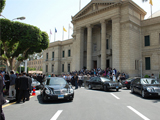Obama: Building Momentum
By Dominic Moran for ISN
The US needs to move quickly to exploit the momentum and popular good-will generated by President Barack Obama's historic speech in Cairo last Thursday.
While his use of excerpts from the Koran and effort to play on his roots and middle name were perceived as overreaching by many in the Middle East, the oration cemented Obama's image as perhaps the only figure capable of driving real change in a region mired in myriad conflicts and petty diplomatic squabbling.
There were no major gaffes in a speech in which he rightly sought to draw a line under the problematic record of the Bush administration while providing little in the way of fresh policy insights.
Obama did particularly well in steering a middle path on the Israeli-Palestinian conflict, emphasizing his administration's commitment both to Israel and to a two-state solution and to the cessation of settlement construction in the West Bank.
His explicit rejection for the first time of "continued settlements," was in response to repeated Israeli government efforts to paint the settlement issue as one on which an understanding exists with the US allowing ongoing building in established communities.
Importantly, the speech also contained tacit recognition of the importance of Hamas to any peace deal with Israel. Obama acknowledged that the Islamic movement "does have support among some Palestinians" and offered Hamas a role "in fulfilling Palestinian aspirations," in return for its acquiescence to Quartet demands.
Disappointingly, the US president stopped short of expressing complete support for the Arab Peace Initiative, which he called an important beginning while demanding greater efforts from Arab states to aid the Palestinians and on Israel.
Here, the Obama administration is making a mistake. Envoy George Mitchell has completely failed to garner support in allied Arab capitals for further moves to normalize relations with Israel. Such moves would have little impact on Israeli government policy while providing ammunition for domestic opponents in initiating states.
The only explicit mention of Lebanon came in reference to the protection of religious minorities, but the timing of the speech spoke to an important short-term goal: to bolster the allied March 14 coalition's vote in yesterday's Lebanese election.
Obama knew that reiterating extant warnings that the US could withhold support in the event of an electoral victory for Hizbollah and its allies would be unnecessary and counterproductive, smacking of an effort to directly influence the election.
With one eye on another election, he restated his administration's support for nations' rights to civil nuclear development and explicitly recognized his country's role in the 1953 overthrow of the Iranian government – highly symbolic given the coup was prompted by oil nationalization moves. This approach may bear fruit should moderate Mir-Hossein Mousavi win the 12 June Iranian presidential poll.
Obama missed an opportunity to lay out fresh, fundamental US positions on issues of concern to many Arab Muslims, such as the freedom of the press, organization, assembly, representation and speech, treating rights issues in a somewhat elliptical fashion.
The existence of a related, intense ideational contest between secularist values and political Islam is ongoing, is more complex than often presented, and was largely elided by Obama.
Recognition of the same is necessary to prevent this contest from erupting into open conflict and in promoting dialogue and the necessary incorporation of Islamic movements into extant governance structures.

